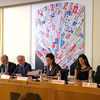Pope Francis Meets Grieving Parents of Youth Pushed into Tiber River
Before his Wednesday audience Pope Francis received the grieving parents of Beau Solomon, 19-year-old U.S. college student who was pick pocketed and then drowned in the Tiber River July 1. Not only Italian crime is to blame, however.
ROME -- Before his traditional Wednesday audience Pope Francis received the grieving parents of Beau Solomon, the 19-year-old American college student who was apparently pushed into the Tiber River at 1:00 am on Friday, July 1, and drowned the very night after arriving in Rome for a summer school course. The pontiff offered the parents "the deepest sense of participation and compassion, and prayers to the Lord for such a tragic loss," according to the pope's spokesman Father Federico Lombardi.
Solomon, a popular student and captain of his high school football team in Spring Green, Wisconsin, had survived a rare form of cancer when he was a child. He had arrived in Rome June 30 to attend a course at John Cabot University in Trastevere before entering his second year at the University of Madison at Wisconsin in the autumn. Out with friends on his first night abroad, he seems to have been tipsy when he left a pub and was suddently attacked by one or two pickpockets, who made off with his wallet and cell phone.
At that point Solomon raced after one of the pickpockets near the Garibaldi Bridge by Trastevere and, after a quarrel, was apparently pushed into the river. Reconstructions of what is being investigated as a probable murder depends in part upon the account of two witnesses, who have told investigators they saw him being pushed into the river. The alleged pickpocket has been arrested and identified as Massimo Galioto, 40, a homeless man living under the Garibaldi Bridge.
Full autopsy details are not yet available, including whether or not Solomon was intoxicated, as appears likely, but the first report from the coroner's office of the University of Rome, available today, shows that he had water in his lungs and so was alive when he entered the river. On his forehead was a severe injury, according to the autopsy, the result of his head striking against rocks in the river.
The Italian media have dubbed that section of the Tiber "the riverbank of the damned" because so many homeless sleep there. However, the fact that the youth's credit card was very quickly used in Milan with charges of well over $1,000 implies that the Ponte Garibaldi homeless are in contact with efficient crime networks. Moreover, Solomon is the third American youth to have died under similar circumstances in Rome in the past three years; one near the same bridge, the other near train tracks close to the Central Station.
The apparent murder has shocked and saddened all of Italy, as well as his family and friends at home in Wisconsin. Obviously in the light of bloody massacres worldwide, this is only one incident, but it has elements worth considering. One is that many American college students arriving in Italy can, for the first time, purchase alcoholic drinks without having to demonstrate that they are at least 21 years of age. When they do have free access to as much alcohol as they want, they overdo the fun.
This is encouraged, in the area around Rome's Campo di Fiori and in Trastevere, by the bar owners who advertise, in the cafe windows, a shot of vodka for under $2.25 and six beers for under $11. Police there are under-staffed, almost needless to say, and fights between drunken individuals in the early hours of the morning are unfortunately frequent.
What is to be done? It is up to Italy but also to American families and universities to make the newly globalizing students aware of the different drinking cultures and of the care they must take. This becomes all the more important because U.S. colleges are now sending some 340,000 students abroad, a 5% hike over last year. The University of Wisconsin, as well as John Cabot University, warns students to be responsible in their consumption of alcohol "because alcohol use in certain situations or contexts is very different than at home," to quote Wisconsin.
This is, however, to beggar the case. The fact is that the college culture of "Getting Wasted," the title of a book by sociologist Thomas Van Der Ven, is as American as, well, apple pie. That culture dates from the Prohibition era, but, as Van Der Ven points out, it began with the most up-market U.S. universities, where it was a status symbol to buy buddies rounds of drink, implying that you don't have to study hard or to behave responsibly because you are wealthy and entitled. So even as the U.S. and Italy both mourn the death of a likeable young man, and grieve with his parents, sharing the prayers of the pontiff, U.S. universities ought to tackle the question of why getting wasted continues to be a particular privilege of, especially, fraternities.
This is not only about the Italian homeless.It's a dangerous mix. And one of the saddest off-shoots is, as I know from having lived in Trastevere and near Campo de' Fiori, that Italian students are tending to emulate the Americans. Getting wasted is going global.





































i-Italy
Facebook
Google+
This work may not be reproduced, in whole or in part, without prior written permission.
Questo lavoro non può essere riprodotto, in tutto o in parte, senza permesso scritto.